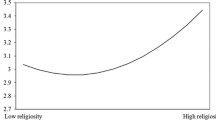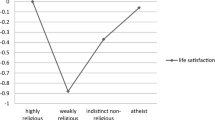Abstract
This research aims to explore Satisfaction with Religiosity/Spirituality (SR/S) in a large sample of Muslims (1388 males, 1172 females) from Algeria. It also provides empirical evidence for the addition of a SR/S Domain item to the Personal Well-Being Index (PWI). A questionnaire dealing with satisfaction with a range of personal and societal domains was used. Results support previous findings (Wills Journal of Happiness Studies 10(1):49–69, 2009), and are in agreement with the recommendations of the International Well-being Group (Group discussion, 2006; IWG 2006). The new domain item makes a statistically significant — albeit a slight — contribution in predicting general satisfaction with life (SWL). Notably, higher satisfaction with religiosity/spirituality is found in women compared to men, married individuals compared to single ones, and inhabitants of the Sahara desert locations compared to people from other regions of Algeria.
Similar content being viewed by others
References
Abdel-Khalek, A. M. (2006). Happiness, health, and religiosity: Significant relations. Mental Health. Religion & Culture, 9(1), 85–97.
Abdel-Khalek, A. M., & Naceur, F. (2007). Religiosity and its association with positive and negative emotions among college students from Algeria. Mental Health, Religion & Culture, 10(2), 159–170.
Adsera, A. (2006). Marital fertility and religion in Spain, 1985 and 1999. Population Studies, 60(2), 205–221.
Ardelt, M. (2003). Effects of religion and purpose in life on elders’ subjective well-being and attitudes towards death. Journal of Religious Gerontology, 14(4), 55–77.
Banthia, R., Moskowitz, J. T., Acree, M., & Folkman, S. (2007). Socioeconomic differences in the effects of prayer on physical symptoms and quality of life. Journal of Health Psychology, 12(2), 249–260.
Cohen, A. B., Siegel, J. I., & Rozin, P. (2003). Faith versus practice: Different bases for religiosity judgments by Jews and Protestants. European Journal of Social Psychology, 33, 287–295.
Cummins, R. A. (1998). The second approximation to an international standard of life satisfaction. Social Indicators Research, 43, 307–334.
Cummins, R. A., Gullone, E., & Lau, A. L. D. (2002). A model of subjective well-being homeostasis: The role of personality. In E. Gullone & R. A. Cummins (Eds.), The universality of subjective well-being indicators. The Netherlands: Kluwer Academic Publishers.
Cummins, R. A., Eckersley, R., Pallant, J., Van Vugt, J., & Misajon, R. (2003). Development of a national index of subjective well-being: The Australian Unity Well-being Index. Social Indicators Research, 64, 159–190.
Cummins, R. A., Lau, A. L. D., Mellor, D., & Stokes, M. (2009). Encouraging governments to enhance the happiness of their nation: Step 1: Understand subjective wellbeing. Social Indicators Research, 91, 23–36.
Diener, E. (1984). Subjective well-being. Psychological Bulletin, 95, 542–575.
Diener, E., & Seligman, M. E. P. (2004). Beyond money: Toward an economy of well-being. Psychological Science in the Public Interest, 5(1), 1–31.
Diener, E., Suh, E. M., Lucas, R. E., & Smith, H. L. (1999). Subjective well-being: Three decades of progress. Psychological Bulletin, 125(2), 276–302.
Dierendonck, D. V. (2005). The construct validity of Ryff’s scales of psychological well-being and its extension with spiritual well-being. Personality and individual differences, 36, 629–643.
Ellison, C. G., & Levin, J. S. (1998). The religion health connection: Evidence, theory, and future directions. Health Education & Behavior, 25(6), 700–720.
Emmons, R. A., & Paloutzian, R. F. (2003). The psychology of religion. Annual Review of Psychology, 54, 377–402.
Frank, N. C., & Kendall, S. J. (2001). Religion, risk prevention and health promotion in adolescents: A community-based approach. Mental Health, Religion & Culture, 4(2), 133–148.
Glock, C. Y. (1962). On the study of religious commitment. Religious Education, 57(4), 98–110.
Hall, R. E., & Livingston, J. N. (2006). Mental health practice with Arab families: The implications of spirituality vis-à-vis Islam. The American Journal of Family Therapy, 34, 139–150.
Helliwell, J. F., & Putnam, R. D. (2005). The social context of well-being. In F. A. Huppert, N. Baylis & B. Kevern (Eds.), The science of well-being. Oxford University Press.
IWG (International Well-being Group). (2006). Personal Well-being Index. Melbourne. Australian Centre on Quality of Life, Deakin University. ISBN No: 1 74156 048 9, Retrieved 4 October 2007, from http://www.deakin.edu.au/research/acqol/instruments/well-being_index.htm
IWG (Group discussion on spiritual/religious domain), (2006). Melbourne. Australian Centre on Quality of Life, Deakin University. Retrieved 4 October 2007, from http://www.deakin.edu.au/research/acqol/instruments/well-being_index.htm
Lau, A. L. D., Cummins, R. A., & McPherson, W. (2005). An investigation into the cross cultural equivalence of the Personal Well-being Index. Social Indicators Research, 72, 403–430.
Levin, J. S., & Schiller, P. L. (1987). Is there a religious factor in health? Journal of Religion and Health, 26, 9–36.
Lewis, C. A., & Cruise, S. M. (2006). Religion and happiness: Consensus, contradictions, comments and concerns. Mental health, Religion & Culture, 9(3), 213–225.
Lewis, C. A., Maltby, J., & Day, L. (2005). Religious orientation, religious coping and happiness among UK adults. Personality and Individual Differences, 38, 1193–1202.
Miller, W. R., & Thoreson, C. E. (2003). Spirituality, religion and health. American Psychologist, 58(1), 24–35.
Mortimer, R. (2006). State and Army in Algeria: The ‘Bouteflika Effect’. The Journal of North African Studies, 11(2), 155–171.
Peterson, M., & Webb, D. (2006). Religion and spirituality in quality of life studies. Applied Research in Quality of Life, 1, 107–116.
Ryan, R. M., & Deci, E. D. (2001). On happiness and human potentials: A review of research on hedonic and eudaimonic well-being. Annual Review of Psychology, 52, 141–166.
Ryff, C. D. (1989). Happiness is everything, or is it? Explorations on the meaning of psychological well-being. Journal of Personality and Social Psychology, 57, 10691081.
Samman, E. (2007). Psychological and subjective well-being: A proposal for internationally comparable indicators. UK: OPHI Working Paper Series.
Sawatzky, R., Ratner, P. A., & Chiu, L. (2005). A meta-analysis of the relationship between spirituality and quality of life. Social Indicators Research, 72(2), 153–188.
Suhail, K., & Chaudhry, H. R. (2004). Predictors of subjective well-being in an Eastern Muslim culture. Journal of Social and Clinical Psychology, 23(3), 359–376.
Tessler, M. (2003). Arab and Muslim political attitudes: Stereotypes and evidence from survey research. International Studies Perspectives, 4, 175–180.
Tiliouine, H. (2009). Stability and change of well-being in Algeria: A developing country in transition. In V. Moller & D. Hushka (Eds.), Quality of life in the New Millennium. Springer (pp. 115–138).
Tiliouine, H., Cummins, R. A., & Davern, M. (2006). Measuring well-being in developing countries: The case of Algeria. Social Indicators Research, 75, 1–30.
Tiliouine, H., Cummins, R. A., & Davern, M. (2009). Islamic religiosity, well-being and health. Mental health, Religion & Culture, 12(1), 55–74.
Veenhoven, R. (2007). Subjective measures of wellbeing. In M. McGillivray (Ed.), Human well-being: Concept and measurement (pp. 214–239). Houndsmill: Palgrave McMillan.
Williams, D. R., & Sternthal, M. J. (2007). Spirituality, religion and health: Evidence and research directions. MJA, 186(10), 47–50.
Wills, P. (2009). Spirituality and subjective well-being: Evidences for a new domain in the Personal Well-being Index. Journal of Happiness Studies, 10(1), 49–69.
Acknowledgements
I thank the members of the Laboratory of Educational Processes & Social Context (Labo-PECS) of the University of Oran, Algeria for their assistance in field work, and l’Agence National pour le Développement de la Recherche en Santé (ANDRS) for partly financing the research (Project: 01/14/00/04/082). I also thank Mark Peterson and two anonymous reviewers for their insightful comments.
Author information
Authors and Affiliations
Corresponding author
Rights and permissions
About this article
Cite this article
Tiliouine, H. Measuring Satisfaction with Religiosity and Its Contribution to the Personal Well-Being Index in a Muslim Sample. Applied Research Quality Life 4, 91–108 (2009). https://doi.org/10.1007/s11482-009-9074-x
Received:
Accepted:
Published:
Issue Date:
DOI: https://doi.org/10.1007/s11482-009-9074-x




